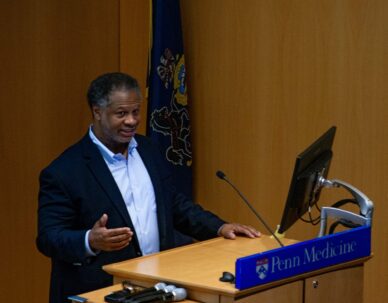
NOURISH: Screening for Food Insecurity in Oncology Settings for Underserved Rural Communities
- Clinical Transformation,
- Health Equity
NOURISH is developing a food insecurity screening tool specific to rural-based individuals with cancer to improve treatment adherence, health outcomes, and quality of life. Results from this project will inform a future randomized trial of early food insecurity screening and intervention among rural oncology patients.
Food insecurity, or the lack of consistent access to safe and nutritious food, accounts for almost twenty-five percent of all income-related cancer care disparities in the United States and disproportionately impacts patients with newly diagnosed cancer and patients with cancer living in underserved rural communities. These patients are ten times more likely to delay or avoid treatment, and are more likely to experience complications during treatment such as infections, immunosuppression, and mental health issues.
Solutions to address food insecurity—including food vouchers, food pantries, and nutrition counseling—have been shown to improve treatment adherence, quality of life, and health outcomes. Despite this, there exists a need to assess optimal methods of food insecurity screening to specifically address rural and underserved patients with cancer. With the aim of reducing the burden of food insecurity among patients with cancer, researchers from the University of Pennsylvania (Penn School of Social Policy & Practice, Penn Medicine, and Penn School of Nursing); Lancaster General Hospital; and Tennessee Oncology are developing, refining, and assessing the acceptability and feasibility of a food insecurity screening tool in a rural community oncology practice.
Led by PC3I Associate Directors Tamara Cadet, PhD, LICSW, MPH and Ravi Parikh, MD, MPP, FACP with support from Karen Glanz, PhD, MPH and PC3I Director Justin Bekelman, MD, this project will use existing food insecurity screening tools to refine and develop a short Cancer Food Insecurity Tool (C-FIT) that is specifically applicable to medically underserved rural-based individuals with cancer. Additionally, the research team will evaluate the association between food insecurity and social determinants of health (SDOH) barriers, which are non-medical factors that influence health outcomes such as transportation access, language, socioeconomics, and housing status. Participants will be interviewed using existing food insecurity screening tools and asked to share their views on the effectiveness of these tools. An additional group of participants will be interviewed using the C-FIT screener and be assessed on their perceptions of the acceptability and feasibility of C-FIT. Results from C-FIT interviews will be compared to the results of existing screening tool interviews. To identify co-occurring SDOH barriers, the project team will assess the correlation between each participant’s C-FIT screening and the responses on an SDOH survey.
To further advance health equity, this project will engage food insecure communities as equal collaborators in solution development, obtain community evaluation of screening benefits, develop a framework to collect additional SDOH information, and deliver the best available resources for individuals who screen positive for food insecurity. Results from this project will inform a future randomized trial of early food insecurity screening and intervention among rural oncology patients and future use of the Community Based Participatory Research Model (CBPR), a collaboration between community organizations and investigators, in medically underserved food insecure groups. Pending pilot findings, the research team will design a future intervention involving training social workers to administer the C-FIT routinely.
Tennessee Oncology (TO); Penn School of Social Policy & Practice (Penn SP2); Lancaster General Health (LGH)
Project Leads
Project Team
-
Justin Bekelman
-
Erin Checchia
-
Karen Glanz
-
Richard L. Martin

